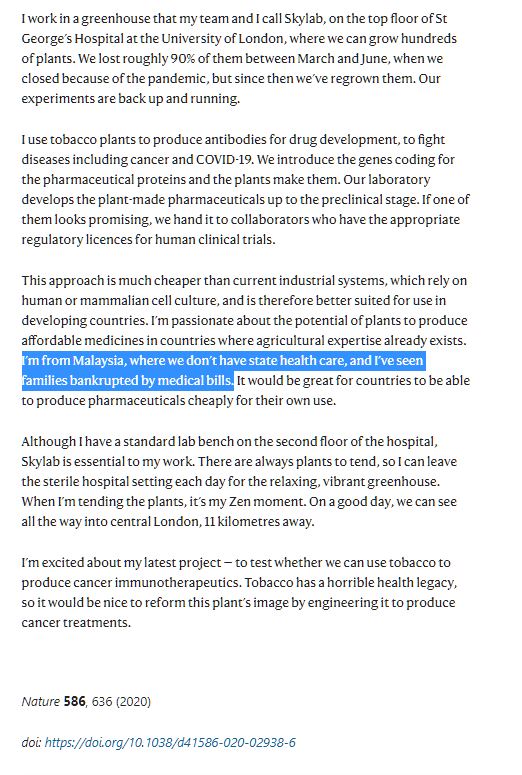Wrong trespassing information on Malaysian Health Care System by molecular immunologist at University College London
To the Chief Editor,
Nature magazine
The Ministry of Health (MOH) Malaysia would like to refer to the article written by Virginia Gewin in the “Where I Work section” of Nature, published on 22nd October 2020, https://doi.org/10.1038/d41586-020-02938-6.
MOH Malaysia congratulates the Malaysian molecular immunologist Ms Audrey Teh for her on-going research work at the St George’s Hospital, University of London (according to the article). The country is always proud when Malaysians are involved in worthy evidence-creation. However, we voice our deep concern about erroneous statements on the Malaysian health system, whether from the interviewee, the interviewer/writer or due to inadequate fact-checking by the editors. Thus, we share publicly available evidence to refute these inaccuracies.

Malaysia achieved effective universal health coverage (UHC) in the 1990’s, through tax funded public provision of health care services (Savedoff and Smith, 2011). The Government of Malaysia provides highly subsidised healthcare for all residents through its extensive network of public hospitals and clinics. A comprehensive range of services are covered, including health promotion, disease prevention, curative, and rehabilitative care. All residents of Malaysia are able to access these services with minimal payments, while services for disadvantaged populations such as the poor, disabled and the elderly are provided free of charge (WHO, HIT 2013). This creates a strong safety net, ensuring that no one is denied access to needed healthcare, regardless of ability to pay. World Health Organization (WHO) continues to acknowledge Malaysia as providing quality health care services based on its high performing health care system and well-trained workforce (Lo and Allotey, 2018).
With highly subsidised public health services, the government collects only minimal user fees. For example, in 2018, user fees accounted for only 1.5% of the Ministry of Health’s operating budget, further illustrating the Government’s commitment towards alleviating the financial burden of accessing healthcare (MOH Annual Report, 2018). In many respects, the Malaysian public healthcare provision which is practically free for all at the point of service is similar to the UK’s National Health Service (Savedoff and Smith, 2011). Hence, we find the article’s statement regarding the lack of state healthcare in Malaysia to be categorically incorrect, and a gross misrepresentation of the Malaysian health system.

With highly subsidised and comprehensive public health services for all, Malaysia has one of the lowest incidences of catastrophic expenditures amongst middle-income countries. Malaysia’s rates are even lower than the median rate observed for high-income countries (MHSR 2016). The 2013 Malaysia Health Care Demand Analysis reported that only 0.16 percent of Malaysian households experienced catastrophic spending (which occurs when more than 25 percent of total household expenditures is used for health care). The incidence of impoverishing health expenditures was also found to be low. Only 0.15 percent of
households are pushed below the World Bank’s $2.00 per day international poverty line in any given month (IHSR, 2020). These indicators compare very favourably with other countries at all income levels. However, there are some individuals and families who face financial difficulties when obtaining healthcare, especially if they chose to seek care in the private sector. Thus, the Government of Malaysia continuously strives to improve healthcare governance, delivery and financing, to strengthen financial risk protection for all Malaysians.
Malaysia’s attainment of effective universal health coverage (UHC) in the 1990’s, was achieved in a less costly, more equitable and effective manner compared to many other countries at similar levels of development (Savedoff and Smith, 2011). However, UHC is a shifting goal. As countries develop and income levels rise, people’s expectation also rises, wanting the system to be even more responsive and provide ever higher quality care. With regards to overall UHC progress, Malaysia has done relatively well compared to other countries in the Western Pacific Region. In 2018, Malaysia achieved a UHC index score of 70 for coverage of essential health services (WHO 2018). This, coupled with the low rates of catastrophic expenditures, is evidence that Malaysians are able to access quality health services without having to endure financial hardship in doing so.
References
- Gewin, V. Where I Work: Audrey The Nature | Vol 586 | 22 October 2020 from https://media.nature.com/original/magazine-assets/d41586-020-02938-6/d41586-020-02938-6.pdf accessed on 1st November 2020
- Savedoff, W and Smith, A. Achieving Universal Health Coverage: Learning from Chile, Japan, Malaysia and Sweden. Working paper of the Results for Development Institute, 2011.
- World Health Organization, Regional Office for the Western Pacific 2012. Malaysia Health System Review, Health Systems in Transition, 3(1)
- Lo, YRJ. and Allotey, P. World Health Day 2018. Lesson from Malaysia on Universal Health Coverage, World Health Organization.
- Ministry of Health Malaysia. Ministry of Health Annual Report 2018.
- Malaysia Health Systems Research 2016. Vol 1. Contextual analysis of the Malaysian Health System by Harvard University and Ministry of Health, Malaysia.
- Institute for Health System Research (IHSR), National Institute of Health, Ministry of Health Malaysia (2020). National Health Morbidity Survey (NHMS) 2019. Vol II. Health care Demand
- World Health Organization, Western Pacific Region 2018. UHC and SDG country profile 2018 Malaysia. From https://apps.who.int/iris/bitstream/handle/10665/272313/WPR-2018-DHS-010-mys-eng.pdf?sequence=1&isAllowed=y accessed 31 October 2020
Dakwaan Audrey Teh tidak benar sama sekali - KP Kesihatan








